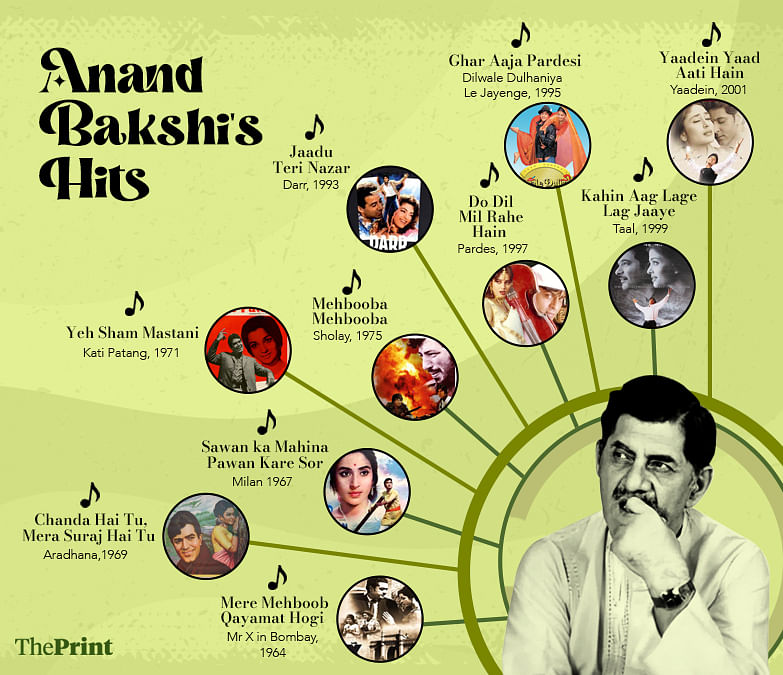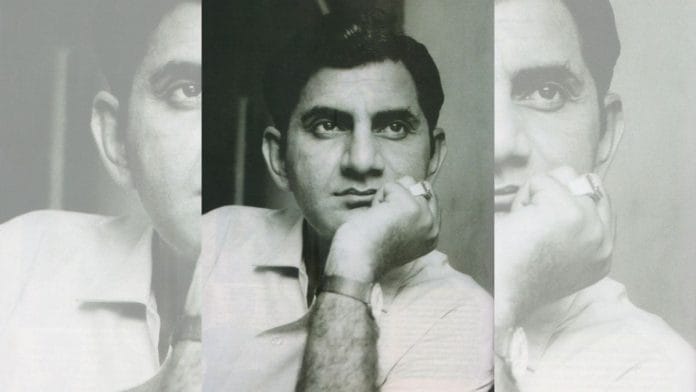When the Congress fired up its Lok Sabha campaign at a mega rally in Nagpur in December 2023, the slogan it chose was ‘Hain Tayyar Hum – We Are Ready’. For Bollywood fans, it was an aha moment. The party had turned to the title song of the 1991 movie Hum, penned by lyricist Anand Bakshi, who wrote more than 3,000 songs for over 300 films.
From Safal Hogi Teri Aradhana (Aradhana, 1969) to Kahin Aag Lage (Taal, 1999) where he collaborated with AR Rehman and the romantic anthem Do Dil Mil Rahe Hain (Pardes, 1997), Bakshi’s lyrics are evergreen. He had the ability to create songs that were both rooted in a particular period and transcended time. He wrote about love, the yearning for home, and paeans to motherhood.
From Tujhe Dekha Toh Ye Jana Sanam in Dilwale Dulhania Le Jayenge (1995) and Zindagi Ke Safar Mein in Aap Ki Kasam (1974) to even Choli Ke Peeche Kya Hai in Khalnayak (1993), Bakshi’s lyrics were simple but conveyed universal feelings. It’s why he was called ‘people’s writer’.
Mumbai’s torrential rains nearly washed away the Bollywood lyricist’s career even before it could take off. When as a struggling poet, the former soldier finally got an appointment with music director Roshan, all public transport in the city had come to a halt due to a downpour the previous night. And so, Bakshi walked nearly 20 km from Borivali to Santa Cruz and reached Roshan’s house in time for his 10 am appointment.
Bakshi was determined to get work and did not care about his torn slippers or broken umbrella. Impressed by his tenacity, Roshan offered the entire album of CID Girl (1959) to him.
And so began the start of a successful career.
In five decades, Bakshi got the Filmfare Award for best lyricist four times in his career and was nominated a remarkable 40 times.
“Lyricists are always bigger than poets. They have to show their skill keeping in mind the story, situation and characters, the preferences of the filmmakers and composers, as well as the trends. And in all this, Bakshi had no equal,” said poet-lyricist Gopaldas Neeraj in an interview.
‘Anand Bakshi is no poet’
Anand Bakshi understood the importance of storytelling. Before writing any song for a film, he would ask the director to narrate the plot—again and again, according to his son Rakesh Anand Bakshi. “And once he had absorbed the film’s plot, even an earthquake could not have distracted him,” he wrote in his book on his father, Nagme, Kisse, Baatein, Yaadein – The Life & Lyrics of Anand Bakshi (2021).
It’s a compelling account of one of Bollywood’s most famous lyricists who was never considered ‘highbrow’ by many of his contemporaries.
“Even after he became successful and was at the peak of his career, some lyricists from the previous generations considered his writing inferior to their own. ‘Anand Bakshi tukbandi karta hai. Woh toh shayar hi nahi (He is a rhymester, not a poet)’,” he wrote. But Bakshi with equanimity would reply, “I have never claimed to be a poet.”

Two people became the lyricist’s mentors. One was Bismil Saeedi, a poet-editor who encouraged Bakshi to pursue his passion for writing. The second one was Chhitar Mal Swaroop, a ticket collector and lover of poetry, who met him at the Marine Lines station in Bombay and invited him to stay after hearing about his struggle.
His writing style was influenced by lyricists DN Madhok and Shailendra –and the Reader’s Digest. It inspired him to be a writer and a father. He was also influenced by the Azaan, the reading of Guru Granth Sahib, recitations of the Ramayana that he would hear from prayer halls as a child growing up in Rawalpindi in pre-independent India, as also songs of farmers.
Hiren Khera’s Mehndi Lagi Mere Haath (1962) was Bakshi’s first taste of success. He first worked with the duo, Laxmikant-Pyarelal, in Jab Jab Phool Khile (1965); every song was a hit. When Laxmikant-Pyarelal did Milan (1967), they got Bakshi on board.
In his song for Milan, Sawan Ka Mahina, Pawan Kare Sor, Anand Bakshi cleverly weaved in a common mispronunciation in Hindi – calling ‘shor’, ‘sor’. This automatically made the track a relatable one for many people in North India. And it demonstrated that he had his finger on the pulse of everyday life in the country’s Hindi-speaking belts.
The fact that his songs resonated with regular Indians was not mere speculation. Once on a train journey, Bakshi met a beggar, who was humming the tune of one of his songs. And that’s when the lyricist finally realised he was popular.
Also read: Singer Mubarak Begum went from poverty to Bollywood & Lollywood. Then her ‘wings were cut’
Turning loss into poetry
One day in the late 1960s, the composer SD Burman briefed Bakshi about a scene in the film Aradhana and asked him to write a song for it. Three days later, when Bakshi presented him with what he had written, the composer was delighted. “How did you write such a wonderful song?” To this, the songwriter replied: “Dada, my mother passed away when I was a little child. When I wrote this song, I thought of her.” The song was Chanda Hai Tu, Mera Suraj Hai Tu.
This was the first of many songs Bakshi wrote on the mother-child relationship. Bakshi lost his own mother at the age of six. As a lyricist, he often returned to the theme of maternal love with tracks like Daiya Ri Daiya Yashoda Maiya for Aasra (1966), Tu Kitni Achchi Hai in Raja aur Runk (1968) and the lullaby Mera Raja Beta Boojhe Ek Paheli in Anuraag (1972).
Soon after the loss of his mother, in the aftermath of the Partition, Bakshi’s family had to shift to India. This was Bakshi’s second big loss, of his place of birth, which shaped a lot of his lyrics. Songs such as Mere Des Mein Pawan Chale Purvai in Jigri Dost (1969) and Aaya Hai Mujhe Phir Yaad in Devar (1966) captured his yearning for his birthplace.
Anand Bakshi died on 30 March 2002 in Mumbai, just a few months before his 72nd birthday. He had been undergoing treatment at the Nanavati Hospital for lung and heart problems. When Rajesh Khanna, who was known to never attend funerals, arrived to pay his respects, people were surprised.
“This man made my career,” said the actor.
(Edited by Zoya Bhatti)






